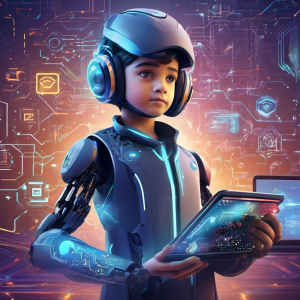Child development is a complex journey, shaped by various factors. Among these, playtime stands out as a pivotal aspect that not only fosters joy and pleasure but also significantly contributes to a child’s growth and development. Nowadays, there are several things and things our children can learn and play together.
Understanding the Role of Play
Playtime isn’t merely a child’s recreational activity; it’s their way of exploring the world around them. From infancy, play serves as a medium for cognitive, emotional, and physical development. Infants engage in sensory play, exploring different textures and sounds, while toddlers immerse themselves in imaginative and pretend play, laying the foundation for social and emotional intelligence. But please beware! I know many of parents who are giving their children smartphones for playing games or watching videos. It’s enormous for small mind to see the virtual world on their own perception, which can be harmful for their future. We don’t know when and where the content or ads will show on their screens, which might not be suitable for your toddlers.

Cognitive Development of Your Child Through Play
The cognitive benefits of play are extensive. Through play, children enhance their problem-solving skills, creativity, and imagination. Whether engaging in building blocks, puzzles, or imaginative play scenarios, they’re constantly honing their cognitive abilities. Moreover, games that involve rules, like board games or organized play, aid in developing their logical thinking and decision-making skills. Physical games are more beneficial for any age of child than indoor or digital games. Physical games make your child bolder in personality, boost their immune system, and make tougher things easier.
Emotional and Social Development
Playing video games is a powerful tool for emotional and social growth. It’s during playtime that children learn to navigate social interactions, negotiate, share, and resolve conflicts. Role-playing games, for instance, allow kids to step into different roles, fostering empathy and understanding of others’ perspectives. Additionally, play helps in managing emotions, as children express and regulate their feelings during various play activities.

Physical Growth and Well-being
The physical aspect of play is evident as kids jump, run, climb, and engage in various physical activities. These movements not only promote motor skills development but also contribute to overall health and well-being. Whether it’s playing tag at the park or participating in organized sports, physical play is crucial for a child’s healthy growth. So, in my opinion, do not block your child development and prgress from playing outdoor games, as it will shape their personality and make them confident.
But safety is priority. If your child want to play football on the ground, they must have their proper gears like knee guard, spike shoes, etc.
The Role of Parents and Caregivers
As a parent or caregiver, being actively involved in your child’s playtime can significantly impact child development. Providing a favorable environment that encourages exploration and creativity is key. Ask them about the progress, Offering a variety of toys, games, and safe spaces for play helps stimulate different areas of development. Some people have larger homes or play areas, but some people do not. So think about their fun and organize a place for them to play. How to manage your busy time to play with kids is crucial for working parent and caregivers. you can get the ideas and guidelines from here. https://wardrobedesire.com/working-parents-balancing-work-and-family-life/
“Incorporating play into daily routines is essential for overall child development.”
Integrating play into daily routines doesn’t have to be complicated. Engaging with your kids through activities like storytelling, arts and DIY crafts, or even involving kids in daily chores in a playful manner can be highly beneficial. Crafting is an essential role in growing your child with wisdom. Share your ideas and implement their ideas. The essence lies in creating an environment where play isn’t just an activity but a way of learning and growing.
Conclusion
Playtime for kids is far more than a child’s source of fun; it’s their window to understanding the world and themselves. By recognizing the significance of play in child development, parents, caregivers, and educators can actively engage in fostering an environment where play is not only encouraged but memorable as an integral part of a child’s growth journey.




